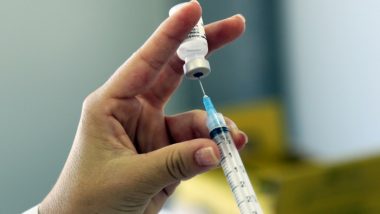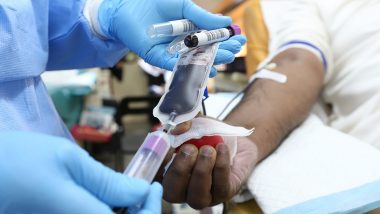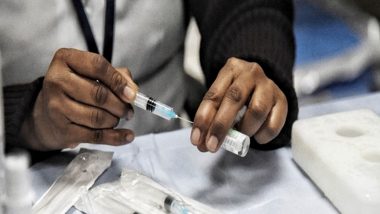Richmond (US), Aug 2: The increasing prevalence of new variants of the coronavirus raises more and more questions about the level of protection even after vaccination: won't these changes in the SARS-CoV-2 virus escape the immunity obtained?
The microbiologist and specialist in infectious diseases William Petri , of the University of Virginia, answers the most frequent questions about vaccines and their recall in 6 points. Delta and Delta Plus Variants FAQs: Is New Variant Deadlier? Know Everything About Coronavirus Mutation, Symptoms and Efficacy of COVID-19 Vaccines.
1. What is a vaccine booster?
A vaccine booster is the injection of an additional dose, intended to maintain immune protection against a given pathogen. The process is common because our immunity can weaken over time quite naturally. For example, the flu shot must be repeated every year, those against diphtheria and tetanus every ten years.
The vaccine injected during the booster is often identical to the first. But not necessarily: when the targeted virus is known to evolve rapidly, its vaccine must be modified regularly in order to adapt to it: this is for example the case for seasonal influenza, whose vaccine must be readjusted every year on pain of obsolescence.
2. Do we already need a reminder for the Covid?
At the beginning of July in the United States, after an intense vaccination campaign lasting several months, no health authority (Centres for Disease Control and Prevention, the Food and Drug Administration and the Advisory Committee on Immunisation Practices) yet sees the interest. (Editor's note: in Israel , the authorities are encouraging people over 60 to take a third dose. In France, discussions are underway regarding the most vulnerable groups who were vaccinated first.) FAQs on COVID-19 Vaccination: Experts Answer Frequently Asked Questions About Vaccine and Inoculation.
3. Why are recalls not yet recommended?
Even if the benefit of a vaccine is not eternal, the moment when it will fade in the case of Covid-19 is not yet established.
This is particularly because all currently authorized vaccines against Covid-19 induce good immunity. They allow the B lymphocytes with “memory” of our immune system to register the properties of the pathogens with which we are confronted, and therefore to launch the production of adequate antibodies in the event of new exposure. High level of memory B lymphocytes have in fact been detected in vaccinated persons (Pfizer) at least 12 weeks after injection.
Other studies also suggest that these vaccines, even if they do not necessarily prevent contamination, offer some protection including against emerging strains of coronavirus. For Johnson & Johnson, 73% and 82% efficacy against severe forms of the Beta variant were observed 14 and 28 days after injection, respectively. For Pfizer, preliminary results suggest an efficacy of 88% against the Delta variant.
Long-term immunity is also provided by plasmoblasts. These cells, other actors in the production of antibodies, do not need a booster and were detected eleven months after injection in vaccinated people: which suggests the establishment of an effective immune memory.
4. How do I know if a recall will become necessary?
A sign of the need for a booster would be the growing epidemic among those vaccinated. For now, vaccines remain largely effective...But the exact level of individual immunity they provide is still being evaluated.
To assess this immunity, the researchers are looking in particular at certain antibodies induced by vaccines: those which recognise the Spike protein, allowing the coronavirus to enter cells, and which would be of major importance.
In support of this idea, a study showing that mRNA vaccines (Pfizer and Moderna), which appear to be the most effective, generate a higher level of antibodies in the blood than adenovirus vaccines (Johnson & Johnson and AstraZeneca ). A preliminary study also suggests that the level of anti-Spike antibodies would be lower in former Covid-19 patients, including after injection of the AstraZeneca vaccine.
Of course, medical staff would like to be able to already offer their patients blood tests capable of reliably measuring their level of protection against Covid-19...Which would indicate, clearly, if anyone needs a reminder .
But until researchers know for sure how to measure immunity induced by vaccination, the sign to follow as to the need for a booster will be, as noted previously, the evolution of the number of infections in people who have been vaccinated…especially after a certain age: in fact, after 80 years of age, vaccination leads to a lower production of antibodies and therefore an immunity which could possibly decline more rapidly than in the general population. The elderly may also be more susceptible to the new variants .
5. Does being immunocompromised increase the need for a booster?
Immunosuppression could indeed necessitate a booster. One study showed that in 39 out of 40 kidney transplant recipients and a third of the dialysis patients considered, vaccination did not result in detectable antibody production.
Same observation in another study, this time conducted in 20 patients with musculoskeletal diseases and under immunosuppressive treatment. In both cases, however, all patients were fully vaccinated.
This is not to say that vaccination is of no benefit to people who are immunocompromised. At least one study shows that a booster can have a positive effect: in a third of transplant patients vaccinated with Pfizer or Moderna, if the first two doses failed to detect antibodies, an immune response appeared with the third. (Editor's note: In France, the Directorate General of Health already recommends this third dose in certain cases.)
How do we know, then, if we are immunocompromised and vaccinated, if our immune system needs this additional stimulation? Preliminary results suggest that a test specifically targeting anti-Spike antibodies induced by a vaccine could help ensure that the vaccine worked. But for the time being, in the United States, this kind of protocol is not yet recommended by the FDA.
6. Do I need the same vaccine for the booster as for the first injections?
It is very unlikely. It has been shown that mRNA vaccines (such as those from Pfizer and Moderna) can even be coupled with adenovirus vaccines (such as AstraZeneca) without loss of efficacy.
(This is an unedited and auto-generated story from Syndicated News feed, LatestLY Staff may not have modified or edited the content body)













 Quickly
Quickly





















